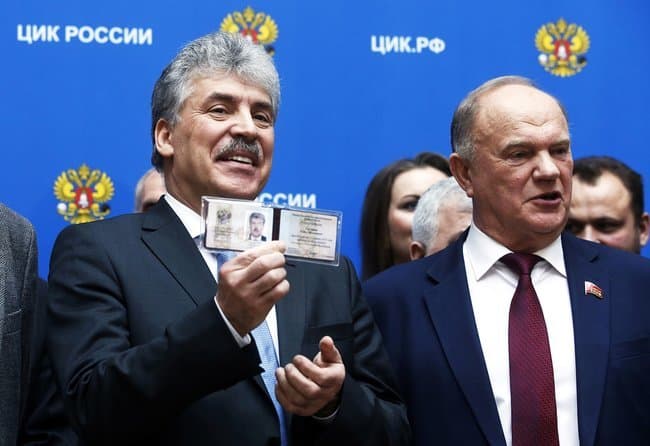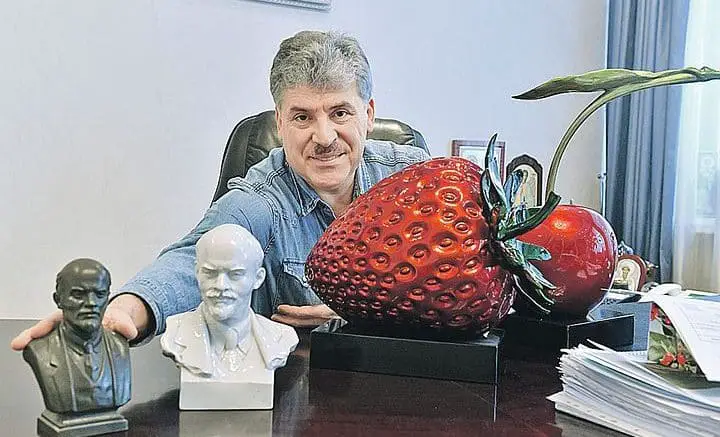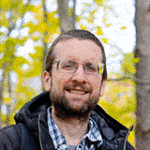Pavel Nikolaevich Grudinin is the current Russian presidential nominee from the Communist Party of the Russian Federation (KPRF). As he is not a member of the KPRF, but a millionaire businessman, his nomination came as a surprise to most who watch Russian politics. The KPRF’s decision not to field their long-time leader and co-founder, Gennady Zyuganov, as they have in nearly every election for over 20 years, was equally surprising.
Some have seen the move as potentially shrewd while others have argued that it was a major misstep. How his candidacy is interpreted largely depends on how Grudinin is seen as an individual and as a so-called “social entrepreneur.”
Early Life and Education
Pavel Nikolaevich Grudinin was born on October 20, 1960 to parents Nicholas and Seraphim, who met as agricultural students in Moscow. One year after his birth, Grudinin’s parents began working at the State Farm Imeni Lenina in Moscow’s Leninsky District, which would become his life-long home and employer.

Grudinin on the State Farm Imeni Lenina during his youth.
Grudinin received his bachelor’s degree in agricultural engineering from the Moscow Institute of Agricultural Engineers in 1986, and a law degree from the Russian Academy of Public Administration in 2001. He began to work alongside his parents at the State Farm Imeni Lenina in 1982, quickly becoming head of the mechanical workshop and, with perestroika in 1990, Deputy Farm Manager for Commercial Affairs.
Peter Ryabtsev, the farm’s director of 20 years, continued to manage the farm’s affairs after the fall of the USSR, but scandal gripped the farm during the 90s as Ryabtsev leased portions of non-tillable land to businesses but the extra revenue disappeared before reaching the farm. Meanwhile, 5.5 billion rubles ($1.2 million at the time) of debt accumulated. Ultimately, Ryabtsev stopped paying the farm’s electricity and gas bills, taxes, and, finally, staff salaries.
In 1995, a general assembly of farm employees nominated Grudinin as the new director. Although the official version states that Ryabtsev voluntarily stepped down – Ryabtsev himself claims to have documentation proving he suffered a stroke and willingly left the farm – there are rumors that Grudinin “asked” Ryabtsev to step down after gaining access to financial information which implicated Ryabtsev in embezzlement and corruption.
Director of the Lenin State Farm
After taking control of the farm, Grudinin – described at the time as young, modern, and energetic – set about trying to bring the farms’ finances under control.
One of his first moves was to reorganize the farm as a closed joint stock corporation. Following the dissolution of the USSR, most collective farms collapsed as centralized management and financing systems disappeared. Those close to urban areas were particularly vulnerable, as the shares, equally distributed to all workers when the former USSR tried to privatize state property, were often bought up by real estate developers or speculators with no interest in farming. Grudinin moved to reincorporate the farm as a closed joint stock corporation, which protected it by removing the shares from open trading. The farm, however, continued to be run as a collective agricultural enterprise.

Pavel Grudinin showing his official document that identifies him as a registered candidate for President. To his left is Gennady Zyuganov, the long-time leader of the KPRF.
Grudinin also sold 5.6 hectares (of 1447 total) to bring in enough cash to pay off about 3/4 of the debt acquired under the previous management. The sell was also a strategic: the land was used to build a highway intersection connecting the Kashira Highway to the Moscow Ring Road, creating a direct link to the markets in Moscow.
Both the land sale and the reorganization brought new controversy. Grudinin sold the land for $5,200 per square meter – remarkably low for land inside Moscow’s Ring Road, which, at the time, experts priced at $100,000 per square meter – to a company called Crocus International, owned by the wealthy businessman Araz Agalarov who, rumor has it, helped Grudinin consolidate power. Crocus used the land to build a shopping and entertainment complex.
Further, as Boris Yeltsin, in 1991, decreed that every individual engaged in collective farming at the time of Soviet collapse was entitled to 15 acres of the land they worked, many of the farm employees argued that the land was not, in fact, Grudinin’s to sell. When the state farm transformed into a joint stock company, these land rights were forfeited in exchange for shareholder rights. Some later said that they had never agreed to that arrangement.
Grudinin offered to sell back portions of the land, but only at $1,500 per 100 square meters, which most workers could not afford. Many argued they shouldn’t have to buy their own land anyway.
Others have criticized the reorganization itself as well. In 1995, the State Farm Imeni Lenina was owned by 526 individuals, but a closed joint stock organization is permitted a maximum of 50 shareholders, which meant ownership had to be consolidated more than tenfold. Today, just 40 people own the entire enterprise, with Grudinin alone holding 42 percent.
Since 1999, the State Farm Imeni Lenina has consistently been named one of the top 300 Russian agricultural enterprises. Their biggest crop – strawberries – are sold year-round, but apples, pears, currants, raspberries and milk are also produced and processed on the farm. Grudinin was named an Honored Agricultural Worker of the Russian Federation in 2001, and the Leninsky District has become known as “socialist garden” that preserved the way of life destroyed in 1991.

The Leninsky District children’s playground.
By decision of the shareholders, workers don’t receive dividends; instead, all profits are directed to improving wages and providing social benefits. Regardless of their employment status, everyone who lives in the district – currently about 5000 people – ris entitled to free education, sports training, health care, and free, hot lunches. The farm pays half the cost of an apartment for their employees and provides financing for workers to pay the other half in fixed, interest-free installments over 15 years. The average salary is 74,000 rubles ($1,300) per month, or about three times the national average for agricultural workers and enough to be considered middle class in Moscow. Further, war veterans receive a 75,000 ruble bonus every year on Victory Day. Pensioners who work on the farm receive additional vacation days. A huge playground, styled after Neuschwanstein Castle in Bavaria, is also free for all children to use and has become a city landmark.
Although the year-round employees are compensated higher than average for their labor, the State Farm, like many other agricultural enterprises, relies heavily on seasonal labor during peak seasons. Their seasonal employees, which allegedly include undocumented migrants, teenagers and the elderly, are rumored to receive an average of 10-15 thousand rubles (around $250) per month, well below the average monthly salary.
Much of the farms’ success has been made by mechanization and technology brought in under Grudinin’s leadership. However, those that have lost their positions due to this increased efficiency have been retrained and given jobs elsewhere within the complex with no reduction in wages.
Leninsky District residents on Grudinin and the presidential election.
The new technology increased farm productivity by nearly 500 percent. According to the Russian Ministry Agriculture, the farm is now capable of producing tens of tons of fruit annually. Some, however, don’t think this number is actually possible, arguing that the local climate, which only cooperates through June and July, would hinder this type of growth. They believe that the farm illegally imports berries from Turkey and Poland to supplement homegrown crops during the off-season. Although nothing has been proven, two large Moscow grocery stores, Auchan and Metro, have stopped carrying State Farm branded berries due to this rumor. A large portion of sales are carried out through kiosks that sell the berries without branding.
Many other Russian producers, such as Belaya Dacha, prefer to purchase lands in the warmer Kuban area to minimize production costs and maximize capital. However, the State Farm Imeni Lenina also profits from its proximity to the Moscow Ring Road: quick turnover, particularly with strawberries, which can’t be left without refrigeration in the summer or outside of green houses in the winter, helps boost profit.
The farm’s income is further supplemented through real estate leasing, largely handled by Grudinin’s younger son, Anton, as Leninsky District’s proximity to Moscow – just 15 miles south of the Kremlin – is wildly coveted by large corporations. According to the official SPARK database, in 2017 the farm earned more than $8.7 million from such deals with companies such as Transneft, Gazprom, Nissan, Toyota, and Lexus. In 2016, Grudinin sold the Swedish company IKEA 12 hectares for an estimated $1 million.
Political Career
Grudinin’s business dealings have been read as both an asset and liability to his political career. Grudinin calls himself a “social entrepreneur” and argues that although he’s enjoyed a lot of success, his success has also improved the lives all those associated with the farm. While his supporters argue that he has “made socialism work” on the farm, others argue that his primary concern has been not the interests of the proletariat, but his own pocketbook.
Grudinin entered the political sphere with the conservative, patriotic Unity party during the 1997 Moscow Regional Duma elections, serving as the Leninsky District representative and the deputy chairman to the Committee on Budget, Fiscal and Tax Policy. Grudinin consistently won reelection and continued to serve as a member of United Russia after Unity coalesced with other parties to form the ruling party. During the 2007-11 convocation, Grudinin served as the Deputy Chairman of the Economic and Innovation Policy Committee.
Although the party prospered, Grudinin’s relationship with United Russia gradually deteriorated and in 2010, United Russia decided to support another candidate as representative of Leninsky District. Although Grudinin planned instead to run as an independent candidate, he was temporarily banned from running for public office after United Russia accused the politician of inciting national hatred after he explicitly advised against selling apartments to migrants from Central Asia in an interview given to Russian Reporter magazine.
Although a court found, in December 2012, that fragments of the interview were distorted, Grudinin was subsequently denied registration when he tried again to run in 2013 based on those charges and politically sidelined until the Communist Party Congress nominated him with an overwhelming majority (316 to 11) to run in Russia’s 2018 presidential elections.
Their unexpected decision has brought in a slew of theories as to what it means. Some argue that the move is positive, bringing in a new face to replace Zyuganov, now 73 and, rumor has it, ailing. Supporters additionally praise Grudinin’s business record, saying that his has “made socialism work” in his enterprise and theorize that he might update the Communist’s platform on a more “Chinese model” that increases private enterprise. Grudinin has also reached out to several Communist splinter groups including Left Front, which was influential in the 2011-2012 protests. It’s possible that the KPRF is trying to cobble the communist movement in Russia, which was horribly fractured by opposition to Zyuganov’s dogmatic leadership, back together with a new, energetic face.
Detractors, however, point out that Grudinin is not a career politician and has enjoyed little national visibility. One theory says that Grudinin has been chosen as a “disposable” candidate for an election the Communists know will be their worst in post-Soviet history. Grudinin has chosen to be the face of the defeat rather than having it poorly mark Zyuganov’s legacy or taint a more favored prodigy.

The media tends to circulate unflattering photos and redundant soundbites.
Some have theorized that he must be a Kremlin ploy – perhaps to try to bring out more voters without really challenging Putin. However, most TV media has not been kind to Grudinin. Reports focus on his wealth with implications that a wealthy businessman running on Communist ticket is hypocritical or, at very least, dishonest.
In 2017, the farm earned 4 billion rubles ($7.1 million), and according to the Central Election Commission, he has earned an average of 26 million rubles ($460,000) a year over the past six years. However, near the end of January 2018, it became known that Grudnin owned undisclosed bank accounts in both Austria and Switzerland – despite claiming in early December that he had closed all foreign accounts in line with Russian legislation that forbids political candidates from owning foreign assets. Some media outlets have claimed the sum was 7.5 billion rubles ($132 million). The Central Election Commision has since declared that it found $1 million and over 5kg of gold in 13 different accounts. Grudinin argues that the bank had simply not fully updated its records in time for before the check – and that the accounts are, in fact, empty and unused. All the same, the Election Commision has said that this alone is enough for disqualification from the ballot. The case is still being considered.
Later, the media discovered a villa in Spain worth $1 million that they reported belonged to either Grudinin or his son. Initially, Grudinin denied that the villa was his own, but then admitted his son was “associated” with the property.
Many, including United Russia party member Nikolai Cherkasov, have criticized Grudinin’s decision not to join the Communist Party. Cherkasov was quoted as saying “in my view, the fact that he does not join the Communist Party today confirms he is looking for profit.” This, however, is particularly ironic since United Russia has perennially nominated Vladimir Putin as its candidate while Putin has never been a member of United Russia.
Grudinin is popular on the internet for his sharp criticism of government officials, with some of his speeches gathering millions of views on YouTube. Although less popular than anti-corruption activist Alexei Navalny’s documentary exposés, Navalny reposts Grudinin’s videos, with titles such as “A man truly without fear.”
Navalny and Grudinin say a few words about each other.
As a result, Grudinin appeals to a wide swath of voters, from those who would otherwise vote for Navalny to those who are nostalgic for the Soviet Era, nationalists, and others. In fact, Echo Moskvy, a liberal radio station in Moscow, recently polled its listeners on who they would vote for in a race between Putin and Grudinin. Grudinin won by a landslide 91 percent.
In wider national polls that include all candidates, the numbers are very different. Grudinin is polling at around 7 percent and is likely to take a distant second, or even third, to Vladimir Putin’s 70+ percent. Despite his internet presence, without access to a source of positive coverage on national media Grudinin’s numbers are not likely to change much before the election.
As most analysts are not watching the current Russian election for who will win, but rather for signs of what policies Putin will implement in its aftermath, the true task ahead of Grudinin is to try and maintain a leadership role with the Communist Party after the election and what he might be able to do with that leadership role. The Communist Party has been long been slipping in its poll numbers and now risks sliding into oblivion. If not Grudinin, some other strong, new, and charismatic leader will be needed in its near future.




